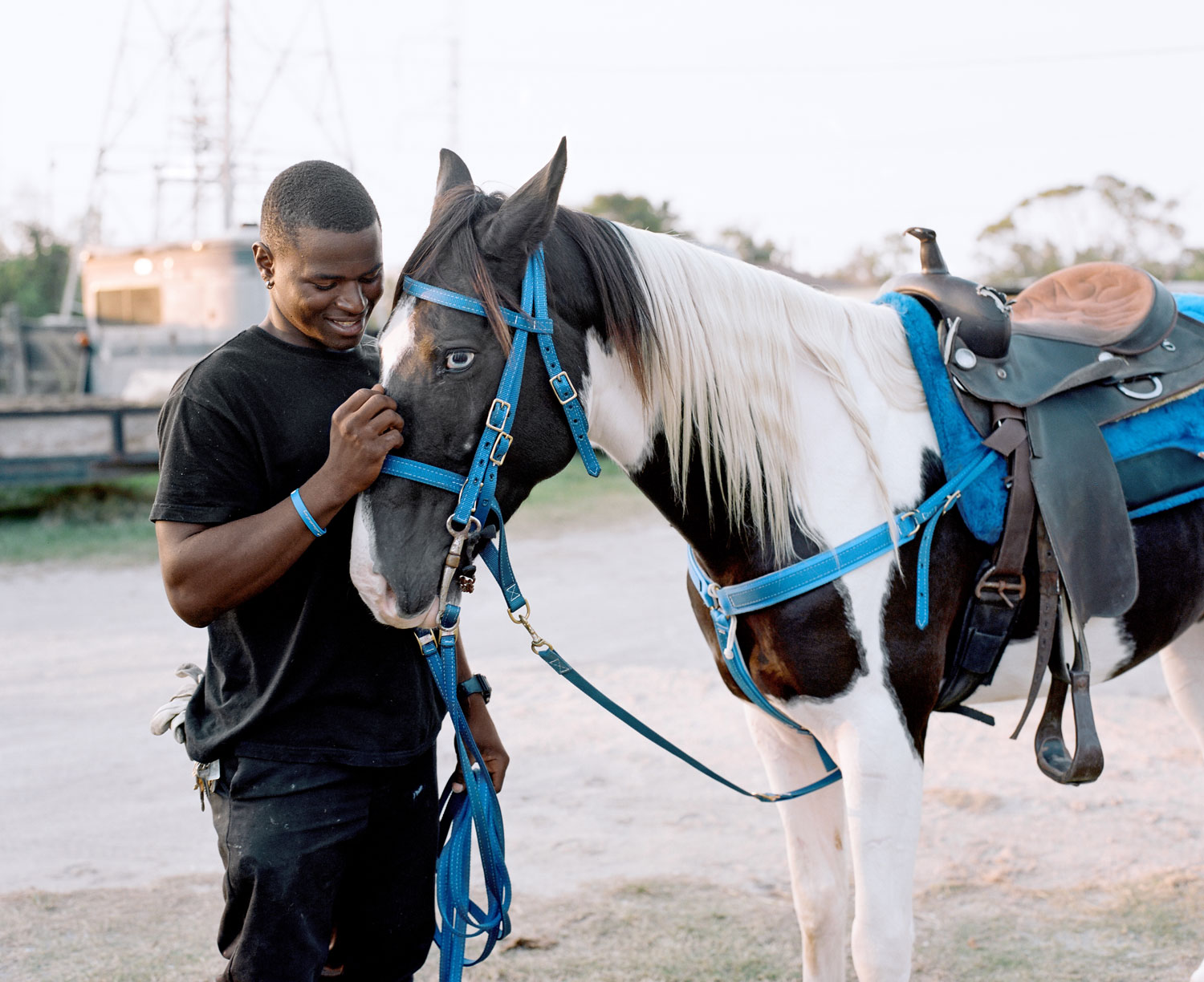Devence, Dwayne, Jessie, Rob and Little Shorty — the young urban cowboys of New Orleans.
Photographs by Akasha Rabut
Words by Sam Feather Garner
The Game Changers and friends before a New Orleans second line parade
Early on a Sunday morning in New Orleans, the street cleaners arrive on Bourbon Street and the last stragglers leave the bars. Some families are dressing for church, but others are primping themselves in a different sort of Sunday best, in preparation for the day’s second line parade. They are putting the finishing touches on elaborate bright costumes and applying make-up while brass bands assemble. Across the Mississippi river in Bridge City, the Game Changers, a group of twentysomethings wearing boots and white T-shirts, are at the stables to groom their horses. While most of the city thinks about brunch, they load the horses into trailers to drive to the twelve o’clock second line.
Second line culture is deeply rooted, and can be traced back to New Orleans’ funeral traditions. To afford a brass band, procession, and burial, black families would pool resources, forming social aid clubs. Members paid dues and paraded together; in turn, when their time came, they were ensured the same dignified procession and a proper burial. These clubs exist today as pleaure clubs. Every Sunday during the season, one of the clubs, with names like the Young Olympians, Zulu, and the Sidewalk Steppers, dress in flamboyant colours and parade through their neighborhood with a brass band, throwing a slow moving dance party that stops at members’ and friends’ businesses as it winds through the streets. This is a second line.
Devence, left, and Dwayne at their stables in Childs Arena, Bridge City
A horseman at a trail ride
Hundreds of people join in, greatly outnumbering the pleasure club. The gatherings are free dance parties, informal fashion shows, and neighborhood networking events — central to the social lives of many black New Orleanians. People dress to impress: it’s easy to find men in three-piece suits, women with 2in fingernails, elaborate sculptural hair and custom RIP T-shirts. Motorcycle clubs assemble; shiny muscle cars and vintage Cadillacs roll by. Certain people become local celebrities, such as the snake man or the kid with the penny-farthing bicycle. They are famous without anyone knowing their name, and the Game Changers are no different.
Unlike a motorcycle or a fabulous outfit, however, horses need to be fed, stabled and groomed, and trained to behave in the hectic environment. The responsibility of keeping the animals is enormous. The Game Changers embrace the work as a part of their lifestyle, along with riding at second lines. People expect them; they are part of the attraction.
Every October, the Game Changers travel west for a trail ride. Ten thousand people gather from all over the South for camping, zydeco music and socialising. On the final day the cowboys ride together, following behind a truck pulling massive speakers. Thousands of horses jostle through the woods with their tipsy riders shouting over the music. The Game Changers ride to represent New Orleans and their urban, less traditional approach to being a black cowboy. Their horses are used to commotion, and aren’t spooked. For Devence, the de facto leader, and fellow cowboys Jessie and Dwayne, the scene isn’t so different from a second line.
Devence grooms his horse, Cane, before a Mardi Gras parade
The Game Changers are young men, but they have inherited a black cowboy tradition of entertaining. Ask, and Devence brings up his idol Bill Pickett, a famous black cowboy and rodeo rider born in 1870. Nor are they the first to show off horses at second lines, a practice that has been in slow decline for decades. As a fixture at second lines, the club hopes to spark youth interest in horses. Families photograph them, pose with them in selfies. Skittish children are urged by parents to stroke the animals’ necks. With every Sunday that passes, the Game Changers are keeping a culture alive and helping define it.
Jessie with Dream




